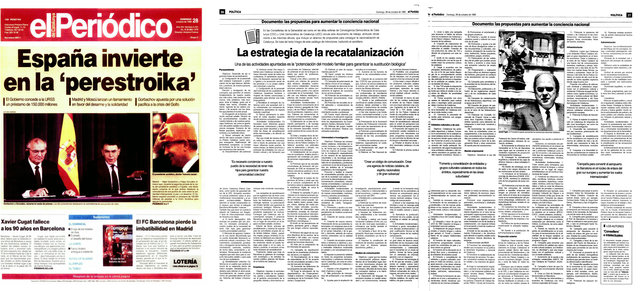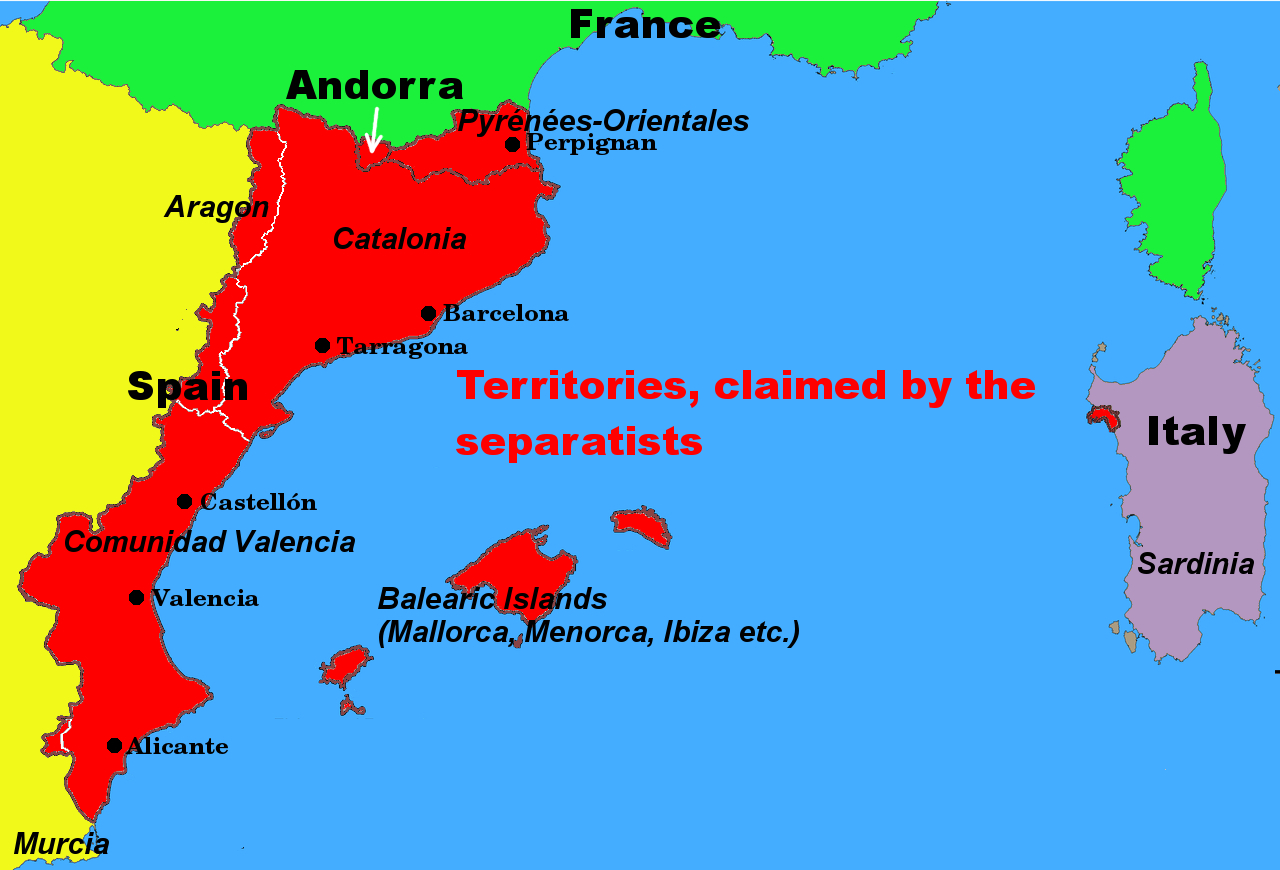Just suspicion of corruption?
Profitable language imposition
February 13, 2022
In January, 230,000 euros of taxpayers' money already went to separatist organisations in Valencia that use language imposition as a means of super-nationalist indoctrination. As if that were not enough, one must also make sure that the money gets into the „right“ hands.
Ximo Puig's government gives another 200,000 euros to his brother's companies headlines esdiariom.com on 7 February and writes: „The regional Ministry of Education, led by Vicent Marzà, is granting more money to the business network of Francis Puig, who is under investigation, to promote the Valencian language.“
There is nothing against giving tax money for languages and culture. But if so, then it must be available for all official languages and paid for by those who participate in them. Catalonia has long been „advanced“ in this respect, because since the last government agreements, subsidies for the Catalan language have to be paid in part by all Spaniards. It is as if the Scots had to pay for the care and maintenance of the Welsh language.
The Spanish government thus had to buy its approval of nationwide laws, but in return does practically nothing to enforce the current regulations of at least 25% Spanish in Catalan schools. What else can one expect from a government that, for example, Spanish judge Joaquim Bosch analyses in a book as „the past and present of political fraud in Spain and (the) phenomenon of revolving doors from which 'almost half of our high-ranking officials' have benefited.“ and asks: „How is it possible that so many millions of euros have been fraudulently allocated in Catalonia without alarm bells ringing internally?...that in Spain, Catalonia is the area with the most institutional integrity problems, followed by the Canary Islands, Andalusia and Madrid“ Obviously, Valencia has to follow suit not only in language imposition but also in corruption, one has to ask mockingly.
The question is, is Spain increasingly becoming a country of absurd lawlessness? After all, the European Parliament is supposed to deal with the fact that the Catalan government is also not thinking of enforcing the minimum 25% Spanish in schools ordered by the highest Catalan and Spanish courts. The AEB (Asamblea por una Escuela Bilingüe = Society for a Bilingual School) had submitted a petition to this effect. The Petitions Committee of the Parliament decided on 7th February to continue an investigation. The president of the AEB, Ana Losada, had been complaining since 2018 that the Spanish government was looking the other way when it came to enforcing court rulings.
„Although the case is still pending in the Committee on Petitions, the European Commission's representative for education, Rajka Lozo, has stated that the European Union does not have competence in linguistic matters, as this is the responsibility of the Member States, although Losada's presentation did not focus on a linguistic issue, but on a possible violation of citizens' rights. Lozo pointed out that 'Member States themselves are responsible for regulating the legal status of official languages in their territories and also in the education system, in compliance with their constitutions', which is why he did not consider it necessary for the European Commission to intervene in this matter.“ says a report by ABC-online.
This fact only shows that parliaments and courts cannot be relied upon. In the Comunidad Valencia, the organisation „Hablamos Español“ has collected signatures for a language law that allows parents to decide on the language of instruction of their children. I will report on the outcome of the signature collection in Valencia, which ends at the end of February.
It is right, but not enough to „ask“ for 25% Spanish. The yielding of the Spanish minority government to regional parties leads, among other things, to the introduction of Immersion, i.e. 100% teaching in the regional language, in the Basque Country just as in Catalonia. How „happy“ will the Spanish-speaking pupils be when, after say 4 years of school in Catalonia, their parents are suddenly transferred to the Basque Country and they cannot learn a day in their mother tongue and cannot even read a Spanish newspaper. The poor are not supposed to be able to do that either, those who have some money send their children to a public school anyway, where the proportion of regional languages is kept to the legal minimum.
The Galician junta (government) is demanding 21 days with only the regional language Gallego, so that at least during these days the pupils do not use Spanish at home or at school. It is not known how they will enforce this „at home“.
But anyone expecting logic in this absurd spectacle should look at the latest news on 8 February: The government of the Balearic Islands is excluding 2,500 workers by retroactively requiring a diploma in the regional language. I quote from the article: „After 17 years working in the Balearic public health sector, Nico is now out on the street. The experience, the constant training, the extra effort during the pandemic, wearing personal protective equipment (PPE) 'five hours a day' and taking on other colleagues' tasks no longer count for Francina Armengol's government. 'The only thing that counts for them now is the policy that I have a degree in Catalan, which I have never needed to treat patients. That's deplorable. It's unfair,' complains the 35-year-old nurse from Andalusia, who has worked continuously in public hospitals since arriving in Mallorca in 2005.“
No to „Catalan countries“
While preparing this blog, I received the news that the „Sociedad Civil Valenciana“ (Valencian Civil Society) adopted a manifesto on 10 February in which it strongly opposes any attempt to be subsumed as „Països Catalans“ and complains, among other things, „that the Academia Valenciana de la Lengua, founded by statute to defend 'the uniqueness of the Valencian language', has no qualms about signing agreements with the Institut d'Estudis Catalans (Institute of Catalan Studies) and the Comisió Técnica de l'Universitat de Les Illes Balears (Technical Commission of the University of the Balearic Islands) to proclaim 'the unity of our Catalan language' with that of“ the Valencian communities. It continues: „We are Valencians and Spaniards, brothers and sisters of all the other peoples of Spain“.
This manifesto, supported by the Royal Valencian Society of Agriculture and Sport, the Royal Academy of Valencian Culture, Lo Rat Penat and the Commercial Athenaeum of Valencia, is seeking support on the internet as a petition on change.org.
| | | | Click here to subscribe or cancel your subscription |
Myths and deceptions of Catalan nationalism

Here you'll find the translation
The strategy of recatalanization
 1980 the Spanish journal "El Periodico" published a secret document about the strategy of the Catalan government. It shows in a frightening way the actual spiritual world of the separatist leaders.
1980 the Spanish journal "El Periodico" published a secret document about the strategy of the Catalan government. It shows in a frightening way the actual spiritual world of the separatist leaders.Now it is available in english translation.
Pancatalanism
the separatist's imperial claim
 The Catalan government exports the conflict into communities with Catalan population, supporting all efforts of the separatists including financial means to destroy Spain.
The Catalan government exports the conflict into communities with Catalan population, supporting all efforts of the separatists including financial means to destroy Spain. An important tool is the establishment of a language dictatorship that is not afraid to use the same means as Franco.
Separatist indoctrination

Click here to read the study
Language imposition and democracy

An essay in 6 parts on the potentially violent effect of language imposition containing contributions from South Africa, Catalonia, Ukraine and France.
go to part 1
Publications
 The title says: "Catalonia, a conflict is exported. Insights of a migrant"
The title says: "Catalonia, a conflict is exported. Insights of a migrant"Sorry, up to now, this book is only available in German. However, drop us a line, if you are interested to learn more Contact.

